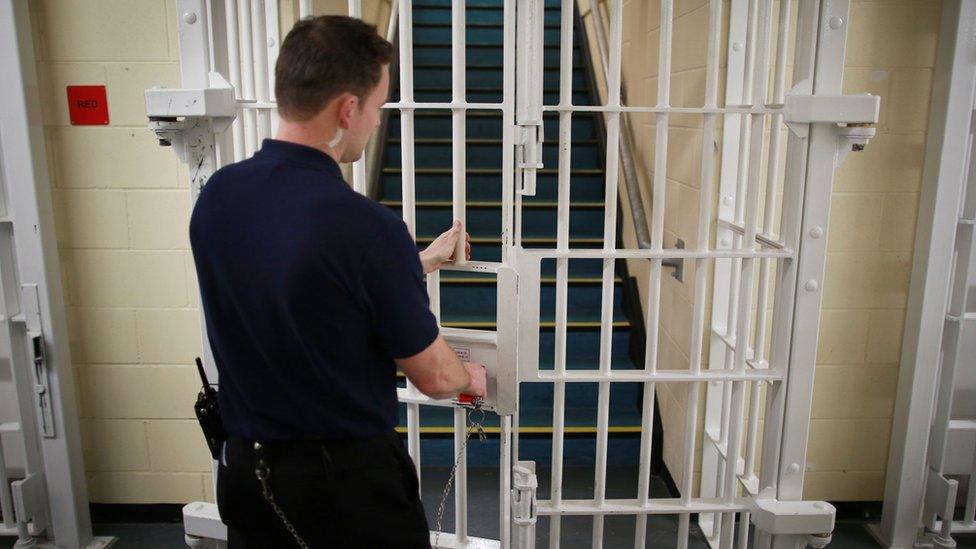Plans to give prison governors control welcomed
- Published

New powers to allow some prisons to set their own rules and budgets and decide how to rehabilitate inmates have been widely welcomed after being outlined in the Queen's Speech.
Governors at six "reform prisons" in England will be given direct control.
Such freedoms for governors should be part of a modern justice system, the Prison Reform Trust said.
But the government must also address "real problems within prisons", the Prison Officers' Association warned.
Juliet Lyon, director of the Prison Reform Trust, welcomed the government's new focus.
"For far too long prisons have been our most neglected, least visible public service," she said.
"More freedom for governors, long overdue access to modern IT, sensible plans for release on temporary licence and constructive use of tagging to curtail liberty should all be part of a modern justice system."
But she stressed the most pressing priority was to restore prison safety and stem a "catastrophic rise" in suicides, violence and disorder.
"Reform will run into the sand unless government is prepared to tackle prison numbers and introduce major sentencing reform as part of its groundbreaking Prisons Bill," she said.
Under the Prisons and Courts Reform Bill:
Governors of six jails will be given control over budgets, decide which rehabilitation and education services to use and be able to change the prison regime and the rules over family visits
The six prisons will be able to enter into contracts and to generate and retain income
Governors will be held accountable by "a new regime of transparency"
Prisoner education will be shaken up at all prisons, with a "bespoke learning plan" for each prisoner
The government hopes to fast-track graduates to work in prisons and boost the quality of teaching
Prisons will have to compile data on education, reoffending and employment on release in a drive for openness
Satellite tracking tags to monitor offenders using GPS will be piloted in eight police areas from September
Some prisoners may become "weekend inmates", allowing them to work in a Monday-Friday job and live at home during the week
"Old and inefficient" jails will close, new institutions will be built
The prisons are:
Wandsworth, south London
Holme House, Stockton-on-Tees, County Durham
Ranby, Nottinghamshire
Coldingley, Woking, Surrey
Kirklevington Grange, Cleveland, North Yorkshire
High Down, Sutton, Surrey
The prime minister first outlined plans to give prison governors "complete control" over their prisons in February.
The education plans follow an independent review of prison education by former head teacher Dame Sally Coates.

Analysis

BBC home affairs correspondent Danny Shaw
The prison reform plans were first outlined by David Cameron in February - and the concerns remain the same now as they were then.
How can such changes have a meaningful impact on rehabilitation, education and reoffending when so many jails are struggling simply to maintain order and stability?
If successful, the greater freedom governors will have, and the incentives on offer for improved performance, may help drive down recidivism levels and, as a result, reduce the overall prison population.
But there are so many factors that affect whether a prisoner steers clear of crime after release - family support, housing, employment to name a few - that there can be no guarantee that the changes to the way prisons are managed will be successful.

The Prison Officers' Association, the sector's union, said it was "still questioning" what freedom for governors really meant.
But it said it would "engage" with any new freedoms. Prison regimes had to tackle the "unprecedented" rise in violence, self-harming and deaths, a statement said.
Frances Crook, chief executive of the Howard League for Penal Reform, welcomed more autonomy for governors but said the success of the reforms would depend on the government driving down prisoner numbers.
The Prison Governors' Association said most governors were in favour of having greater autonomy but some feared that, without increased resources in prisons, they could be "held accountable for matters outside of their control".
Labour's shadow justice secretary, Charles Falconer, said the government had failed "every time" at reforming prisons in the past.
Instead prisons have become "dangerously overcrowded with rising levels of violence, drug abuse and serious assaults on staff", he said.
Of the six prisons pinpointed, inspectors have warned that Ranby prison is at risk of being overwhelmed by the supply of legal highs. A a prisoner was murdered at Coldingley in April.
Chief inspector: 'Some prisons not fit for purpose'
Rapt, a charity which helps prisoners give up drugs and crime, welcomed the changes but said it was "critical" to improve education and tackle the issues of drugs, mental health and violence.